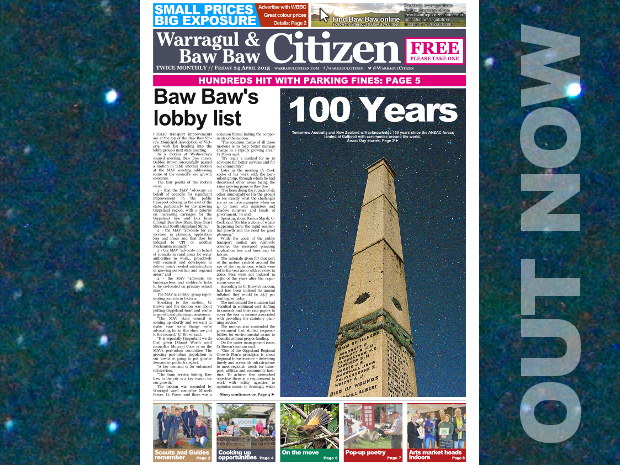
PUBLIC transport improvements are at the top of the Baw Baw Shire’s Municipal Association of Victoria wish list heading into the lobby group’s next state meeting.
First published in the 24 April 2015 edition of the Warragul & Baw Baw Citizen.
ADVERTISEMENT
In a motion at the 22 April council meeting, Baw Baw mayor Debbie Brown successfully passed a motion to table another motion at the MAV meeting addressing some of the council’s key growth concerns.
The four points of the motion were:
- that the MAV “advocate on behalf of councils for significant improvement in the public transport offering in the east of the state, particularly for the growing Gippsland region, with a priority on increasing carriages for the Gippsland line and bus lines through Baw Baw Shire, Bass Coast Shire and South Gippsland Shire,”
- the MAV “advocate for an increase in planning application fees and fines and that they be indexed to CPI or another mechanism annually,”
- the MAV “advocate on behalf of councils in rural areas for water authorities to work… proactively with councils and developers to deliver much needed infrastructure in growing peri-urban and regional areas,” and
- the MAV “advocate for kindergartens and children’s hubs to be co-located on primary school sites.”
The MAV is a lobby group representing councils in Victoria.
Speaking to the motion, Cr Brown said the motion was about putting Gippsland front and centre in growth and planning discussions.
ADVERTISEMENT
“The MAV state council is coming up shortly and we want to make sure some things we’re advocating for in this shire are put to the council,” Cr Brown said.
“It is especially [important we do this] given [Mount Worth ward councillor Murray] Cook is on the MAV’s peri-urban committee. The growing peri-urban population in our towns is going to put greater demand on public transport.
“A key demand is for enhanced rail services.
“The train service linking Baw Baw to the city is a key reason for our growth.”
The motion was seconded by Warragul ward councillor Mikaela Power. Cr Power said there was a common theme linking the components of the motion.
“The common theme of all these motions is to help better manage change in a rapidly growing area,” Cr Power said.
“It’s really a method for us to advocate for better services and for our community.”
Later in the meeting Cr Cook spoke of his work with the peri-urban group, through which he had discovered other areas facing the same growing pains as Baw Baw.
ADVERTISEMENT
“I’ve been doing the rounds of six other municipalities [in the group] to see exactly what the challenges are so we have examples when we go to meet with ministers and shadow minsters and heads of government,” he said.
Speaking about Baccus Marsh, Cr Cook said “it’s like a clone of what’s happening here: the rapid residential growth and the need for good planning.”
While the goals of the public transport motion are relatively obvious, the increased planning application fees and fines may be less so.
The rationale given for that part of the motion centred around the age of the regulations, which were set in the year 2000 with a review in 2010. Fees were not indexed in eight of the years after the regulations were set.
According to Cr Brown’s motion, had fees been indexed to annual inflation they would be 23.3 per cent higher today.
The motion said the situation had “resulted in continual cost shifting to councils and their rate payers to cover the loss in income associated with providing the statutory planning service.”
The motion also contended the government had shifted responsibilities for environmental issues to councils without proper funding.
On the water management issue, Cr Brown’s motion read:
“One of the Gippsland Regional Growth Plan’s principles is about Regional Infrastructure – delivering timely and accessible infrastructure to meet regional needs for transport, utilities and community facilities. To achieve this networked objective there is a requirement to work with utility agencies to optimise access to drainage, water and sewerage to cater for a growing population.
“The lack of timely and appropriate provision of community infrastructure has adverse social impacts on new communities. Developers and water authorities also have a responsibility to ensure that timely and connectible infrastructure is provided, as such these working partnerships are vital.
“Proactive partnerships, planning and advice are required between all parties and should form the basis of the referral and request processes to water authorities by developers and councils alike.”
The kinders motion was relatively brief and straightforward. While acknowledging it is the state government’s policy to co-locate schools and kinders, the motion calls for exactly that to happen.
“Using existing land and facilities also enables greater community benefit through good asset management,” the motion read.
“For growth Councils this also produces a sensible way to meet the needs of rapidly growing communities.”








